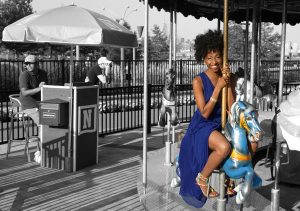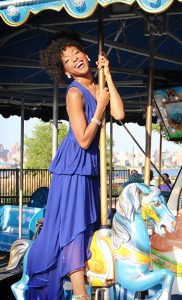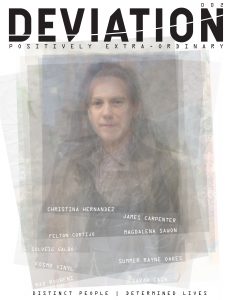N’Kenge: Firecracker

Photo by Ash Hoden
By Ash Hoden
Singer N’Kenge is as radiant off the stage as she is on. I know a guy who calls her Firecracker. Petit, slender, and alive, her overflowing energy removes any doubt as to how she can channel such a powerful voice through such a small figure. She is not the rotund image that comes to mind when I think: opera singer. But this is just the first of my conceptions that will be challenged during our talk.
I ask about her size in relation to other opera singers. “I’m a size zero. It doesn’t get any smaller than that! I always say I have a secret speaker underneath my dress. I joke about it. One of the reasons I almost didn’t get my role at Virginia Opera was that… I had done the young artists program and I had auditioned to be considered for Musetta and, God, they put me through the grind. I kept singing, singing, singing, singing… Then, the director finally said, ‘You’d be a great Musetta, but you’re so tiny. I mean, everyone next to you would look like elephants.’ Literally, they were concerned. It wasn’t like they were getting big, fat, huge opera singers. I was just super tiny. I got the role, but they padded me. They gave me hips and everything, just so I looked like I was a little bigger.”
N’Kenge was always energetic. To the extent that, when she was three, a doctor advised the use of pills to calm her down. “I was bouncing off the walls but my dad was like, ‘I’m not giving my child pills.’ That’s what inspired them to put me in all sorts of activities, including music. I was in karate classes, piano classes, dance, art… Anything you can think of that would channel my energy in a positive way. They thought, “Well, with all this energy let’s put it towards something constructive. Not, drug her. Thank you dad!”
Music was fundamental to her childhood. By the age of six she was recognized as a piano talent and was already doing recitals. Then her interests took a detour at the age of ten. Her class was preparing to do a performance of Snoopy The Musical and during the auditions the teacher heard N’Kenge sing. Surprised by N’Kenge’s talent, the teacher cast her as Peppermint Patty — a role that featured a solo. “I was super tiny. In fifth grade I looked like I was in second or third grade. It was a little hard because I would get teased all of the time because of my size. Kids were always picking on me and pushing me around. Once I was singing and doing the show, kids started looking up to me. The teacher put me on top of a grand piano and I sang Poor Sweet Baby to Charlie Brown and I got a standing ovation from the audience. My parents were shocked. They were coming to see me in a show but they had no idea they were coming to see me sing. Even though I was performing on a certain level with my dance classes and piano, singing was a completely different beast. It was that a-ha moment where I realized: ‘This is it. This is what I need to be doing.’”
N’Kenge stopped practicing piano and dance and began focusing exclusively on singing. Her mother was her first teacher, giving time, support, and encouragement. “She started having me sing to the music of her favorite songs, which are probably not the songs I should have been singing at age ten. But, because these were the songs that she liked hearing, that’s what I was learning. One of the first songs I was singing was Juicy Fruit by Mtume. My mom would say ‘Get into it, get into it.’ And I sing, ‘I’ll be your lolly pop. You can lick me everywhere. Mommy, what does that mean?’ And she says ‘Honey, just sing the song baby. Just sing the song. It’s ok. Just sing it. Lollypop. You know: the lollypops. Go ahead, we’re singing about lollypops.’ So I’m learning Juicy Fruit, songs by Earth Wind and Fire… All the songs that she loved rocking to, that’s what I was singing. And of course, the entire Whitney and Mariah catalog.”
It was also at this time that her father John left the family and her mother founded her business, a staffing firm called Simpson Personnel Services. N’Kenge grew up quickly. “I was at that age where I thought I should be receiving an allowance. My mom said, ‘You want an allowance? Well, you gotta work for the allowance.’ So I was working in the office all the time after school. I was working with temps coming in, greeting her clients, and helping with the telephones as well as interviewing people. It was a little crazy, but I’m happy she did that. I think it was a wakeup call and I now have the business smarts from being exposed to work at such a young age. As well as being a single mom, she was figuring things out with the company, so I was learning through her. She was my mentor.”

Photo by Greg Mac
I ask if she experienced troubled times during her youth, thinking primarily of my own post-divorce angers and the internal identity struggles teenagers go through. “I’m trying to think — troubled times? I guess in different capacities. When it came to auditions and not being ‘right’ for the role. It was really, I wasn’t ‘white’ for the role.”
I say, “There was a lot of politics, wasn’t there?” But this is a poseur response, and it emanates from my own discomforts about openly discussing these racial issues with her. Calling discrimination “politics” effectively sweeps it under the rug. By doing so I passively promoted the very same bigoted practices that N’Kenge was speaking about. This realization, when it later dawns on me, exposed a gaping blindness in my perception of self; in my belief that I’m a fair and tolerant person — specifically concerning race or gender or sexual preferences. Lurking in that “tolerance” is a perceptual framework, or a host of biases, that assumes mine is the normal context. If internal issues of identity are my biggest struggles, then those are the biggest struggles everyone else must face — regardless of race or gender or sexual preference. Regardless of how society receives you, your biggest fight will be with yourself because that’s how it is for me and the white male majority. But in America, if you are black or female or something other than the dominant tribe — in addition to these internal identity struggles — there are the external struggles of not being equally accepted, or outright rejected. This sounds ridiculously obvious in the abstract — America’s systemic racism is no mystery. It’s expressed in myriad different ways, from aggressive acts of violence, such as police shootings, to passive social dishonesties, such as me referring to bigotry as “politics.” Clearly: facing a society that’s structured to hold you down is an entirely different animal than facing your own internalized identity issues in a society that’s structured to prop you up. I failed to recognize how deeply white male privilege has shaped my perception of the world. It allows me to overlook the subtle ways in which I silently condone status quo evils — despite actually being fair-minded, tolerant, and opposed to those evils. My discomfort in openly discussing racial issues with N’Kenge — labeling it “politics” and sweeping it under the rug — was a tacit acceptance of the exact mode of racism she was speaking about. And I must thank her for showing me grace in this moment.
Her answer: “Yeah, there was a lot of politics… You know, just having to maneuver through all of that and still being focused on the prize.”
How did you maneuver through it all?
“The support system. Watching my mom Annette obtain her dreams. She started her company with 75 dollars and she turned it into a million-dollar company. And then also my [second] dad Marty who was always supporting me. They would pay for me to have extra voice lessons, so in addition to the lessons I would get through school, they would be paying for me to have two to three lessons a week. They were always investing in me. Everything was about my music, my music… So, no matter how many “no’s” I got, it was always about that one “yes.” ‘Ok, so I might not be right for that role and I might not be right for that role, but there is going to be a role that I’m right for. So I just have to keep putting myself out there.’”
N’Kenge did continually put herself out there. She was accepted into the Fiorello LaGuardia High School of Music & Art and the Performing Arts and was given a full scholarship to take private lessons with Yvonne Hatchett at the Harlem School of the Arts. Speaking of Hatchett, N’Kenge says, “She found an opera voice in me somewhere, and trained me classically. I think she just had a really good ear and she heard the potential before I, or anybody around me, was able to hear — nor were we trained to listen to that because I didn’t grow up with classical music. I wasn’t listening to opera. Then, suddenly I became an opera singer.” Early in this process she still wanted to learn riffs, though. Hatchett would tell her: “Train the classical way, build your foundation, and then you can do the other styles of music.”
N’Kenge’s high school opera teacher was much less forgiving when it came to other genres. “I auditioned for a cabaret night at my school — one of these review nights where everyone got to sing pop or theater music. I had to miss an opera rehearsal in order for me to do this audition. When my teacher found out, she said, ‘I don’t understand why you were auditioning for that show. What repertoire were you using? What song did you sing?’ I said, ‘I sang Be A Lion from the musical The Wiz.’ And she said, ‘Excuse me?’ And I said, ‘Yeah, and I got accepted and I’m going to be performing it!’ Her reaction was, ‘Oh, no, no, no, no, no. You missed opera rehearsal in order to sing a song from The Wiz? It’s like having a hot dog from one of those wagons and turning down a French gourmet dinner. Since that seems to be your priority and you think it’s more important than doing the Hansel and Gretel, then, um, I guess we won’t need you anymore.’ She kicked me out. I Couldn’t believe it. All because I wanted to sing something other than opera. I was devastated yet determined to rise above it.” N’Kenge never intended to abandon her craft, she simply wanted the freedom to occasionally sing other genres as well. In traditional opera circles that type of freedom was unacceptable.
“Back then they wanted strict opera singers. Having these extra skills was looked down upon. When they looked at my resume and saw The Fantastiks as well as La Boheme, then, ‘Oh, she must not know what she’s doing.’ Or, ‘She must be confused.’ Being versatile wasn’t a welcoming thing. They weren’t in support of that. So they wouldn’t hire me. Thinking, ‘We want to hire somebody who is very committed and focused for the opera world. Not someone who is just trying to figure things out.’ I’m thinking, ‘I’m not trying to figure things out! I want to do opera! I love Opera. How did you suddenly turn me into this confused artist? I’m just an artist that is expanding into other genres. That doesn’t make me confused.’”
When did they become more accepting of a broader spectrum of talent?
“Not very long ago. When I started noticing it I was already in bed with the musical theater world. Doing more musical theater than opera, but realizing, ‘Ohhh, now you guys are getting this. Now you want an opera singer to be able to sing High C’s and then belt out Defying Gravity!’ Ok.”
Perseverance. Despite being expelled from the opera program in high school she continued to study opera privately with Hatchett. Additionally, she did recitals through the Harlem School of the Arts and entered several competitions that offered scholarships — winning a number of them. “I was the first opera singer to win the Lena Horne scholarship and the first recipient to win the ASCAP Lieber & Stoller Award. I used these scholarship awards towards my education at Manhattan School of Music.”
While attending the Manhattan School of Music as an undergraduate N’Kenge was chosen to perform at the White House for President Clinton. “I performed for their holiday special and then I went around to all the government buildings and sang Christmas tunes with a trombone quartet. It was really cool and so thrilling to meet the President and the First Lady. I met Hilary Clinton years later when performing for the Children’s Defense Fund at the Kennedy Center. This time around she greeted me with a huge hug and congratulated me on a wonderful performance. That encounter made my entire year. Yes, I’m a fan!”
Over summer breaks N’Kenge attended programs in Italy, Israel, the Aspen Music Festival in Colorado, and Tanglewood Music. These gave her the opportunity to take full roles in various performances; roles that were reserved for graduate students at the Manhattan School of Music. “I figured, if I’m not going to get it in school and I’m going to graduate, I have to have roles under my belt. I was always thinking ahead. ‘How am I going to support myself when I’m out of school?’” Always working. Throughout university she continued to work at her mother’s company and continually entered competitions in order to earn scholarship money for her education. Once graduated, she was accepted into Juilliard where she completed her graduate studies. Her resume is too extensive to do justice here, but one thing is clear: N’Kenge was right for a lot of roles.
Soon after college she went to Europe to perform in competitions and to audition at several opera houses. “I made the finals for the Francisco Viñas International Competition in Barcelona and I continued all the way to the last rounds. I was the only American finalist in the competition. Every time you would progress to the next round of the competition, the competition would pay for your hotel. But when I didn’t make it to the very last round and I wanted to stay longer, I had to pay for my hotel. With that said, I had made plans to go around Europe and do auditions. I bought a Eurail pass to travel by train. While I was still in Barcelona, I got robbed. Pickpockets. They took everything. I had no money, no cards, nothing. Only my train pass that was left at the hotel. My parents said, ‘You need to just come home. You’re not going anywhere. We’ll buy you a ticket to come home.’ I actually had all these auditions set up — Dusseldorf opera, Essen, Frankfurt, Marseilles Opera, everywhere. I was going to travel from Spain, to France, and through Germany. My mother said, ‘No, no, no, no. We’re not giving you money unless you’re coming home.’”
“So I said, ‘Well, I’m not coming home. I’m going to do my auditions.’ ‘With what money?’ ‘I have my train pass.’ ‘Well how are you going to eat?’ ‘I’ll figure it out.’”

Photo by Greg Mac
“So I was on the street of Ramblas, singing on a box, and this guy approached me, ‘Hey, can you sing at my bar tonight?’ He paid me a hundred dollars to sing for the night. I did that for a couple of nights and it paid for my hotel until it was time for me to go. I traveled on my Eurail pass. At every train station I would sing on the street for money so I could pay for a hotel and food. But there were a couple of times when I was just exhausted. I was a good sport, you know, but I remember there was one night when I was a little short and I was like, ‘I just need thirty more minutes. If I just sing for thirty more…’ I’m tired and I’m getting all sorts of characters coming up to me. Then the police said I couldn’t sing in that area. I was really hungry and I didn’t have enough money. They had machines where they had fried food that you could purchase and I was literally short their equivalent of a dollar. I felt so weak and I was frustrated that I just broke down and started crying. I’m thinking, ‘I’m hungry and I have no place to stay and I have an audition tomorrow and I don’t want to sleep on the train station bench.’ I remember at this moment I mustered whatever energy I had left and went back out. I found another spot where the police wouldn’t find me, and I started singing again. This woman came up to me with her daughter. She said, ‘What are you doing?’ Because I’m singing opera and pop and I had a nice coat on. I obviously didn’t look homeless. They were like, ‘What’s going on? Do you need a place to stay? You can totally stay with us.’ She let me stay in her house for two nights. I auditioned and then she gave me a little cash on the side and that kind of propelled me for all of my other trips. I continued singing to pay for these hotels where you share a bathroom and you just rent a room. Sometimes I would sing and some doctor would give me a hundred dollars. There were many angels I was lucky enough to meet along the way.”
Whether spoken or crooned, N’Kenge tells a superb story.
Get Deviation Issue 002 (Print or Digital)
[fbcomments width="100%" num="10" ]



